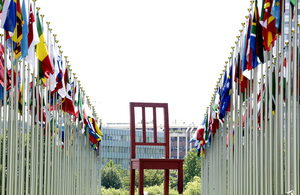The past 12 months have been one of the most challenging periods faced by humanity in modern times. And world governments have responded. They’ve collectively deployed trillions of dollars, particularly in developed nations, to support lives and livelihoods.
And we’ve also seen what the Asian Development Bank has done when faced with a Covid crisis. A 20 billion dollar response package, providing a nine billion dollar facility to help developing member states access and distribute Covid-19 vaccines.
And yet, whilst the world has been battling the Covid pandemic, the other ever-advancing and existential threat of climate change has not taken time off.
And if we’re really serious about climate action, we must show the same urgency and resolve in tackling climate change as we have Covid.
Right now, the world is some way away from meeting the goals of the Paris Agreement.
And the ever stronger effects of climate change are being felt across the world, across Asia. We are heading for average temperature rises of over two degrees. And for very many millions of people across the world, that spells catastrophe.
We have less than a decade left to keep the 1.5 degree target within reach. And that will require us to halve our emissions by 2030.
So, COP26 has to be the moment we get the world on track to make the goals of the Paris Agreement a reality and to keep that 1.5 alive.
To do that, we have four goals for the UK COP26 Presidency.
First, to put the world on a path to net zero emissions by the middle of the century with ambitious national 2030 emissions reductions targets along the way.
Second, to boost adaptation.
Third, to get finance flowing to climate action.
And fourth, for us to work together relentlessly. Enhancing international collaboration on critical issues like clean energy and nature. So that we get this green transition moving faster.
Countries mounting clean recoveries to the Covid-19 Pandemic is absolutely vital.
And, with Asia Pacific’s booming energy demand, actions on a clean energy transition in this region will determine whether or not we achieve our aims.
That makes the work of the ADB absolutely vital.
Because finance underpins all climate action.
And therefore, I call on the ADB to do all it can to support the efforts of countries in the region to deliver on their emissions reduction targets.
Take, for example, scaling up programmes like the NDC Advance platform, to support developing countries with national climate plans.
Or improving access to climate finance, particularly for the most vulnerable.
And then setting an ambitious target of the proportion of climate finance which goes to adaptation whilst increasing support for nature-based solutions.
Investing in climate action as part of a green recovery, is not only good for the planet. It is sound economics.
Every $1 that is invested in adaptation sees up to $10 in benefits.
The global move to green growth creates huge commercial opportunities.
The investments in renewables can create more jobs than their fossil fuel equivalents.
A recent report published by the University of Oxford highlights that investment in renewables infrastructure can create more than twice as many jobs as the equivalent in fossil fuels.
The cost of wind power has dropped by almost 50% since 2010. And the cost of solar energy has dropped by a staggering 80% over the same period.
Renewables are now cheaper than new coal and gas in the majority of the world. And costs will keep falling.
Meeting the goals of the Paris Agreement does not mean weaker economies. Quite the contrary.
So I urge all countries to invest in green recoveries.
And I welcome ADB’s Green Recovery Programme in South East Asia.
By contrast, investing in coal runs the very real risk of stranded assets.
$630billion worth if the existing coal pipeline goes ahead, according to Carbon Tracker.
And putting an end to coal is essential if we are to keep the 1.5 degree target within reach.
Today, global coal use trends are driven primarily by Asia.
So I urge all countries in the region to phase out domestic coal use and end international financing of new coal plants.
Pakistan and the Philippines have said no to new coal.
Korea has vowed to end overseas coal finance.
The tide is turning towards cheaper, cleaner power. But the time for action is now.
And I commend the ADB’s proposals to formally end all coal financing in its own new energy policy.
I also recognise your target to have invested $80 billion in climate finance by 2030.
But in this vital year I urge you to go further:
Make a more stretching target for the proportion of the Bank’s funding that is climate finance.
Increase efforts to mobilise more private climate finance.
Use your energy policy to end support for fossil fuels, except gas in exceptional circumstances.
Set a date by which you will align all your operations with the Paris Agreement, as the World Bank and others are doing.
Use your role as Chair of the Joint MDB Paris Alignment process to urge other MDBs to do the same.
And, with other MDBs, sign a joint statement on nature at COP26.
The role of this region and its institutions is absolutely pivotal. And will determine how and if we secure our future.
Finally, I say this to all friends at this event. If ever there was a cause which deserved vigorous multilateral engagement, climate action is it.
If ever there was a time to elevate the response to climate change and biodiversity loss, this is that time. There will be no second chances.
So let’s work together and make this the year that we put the world on a path to a green recovery and, in doing so, make the goals of the Paris Agreement a reality.

